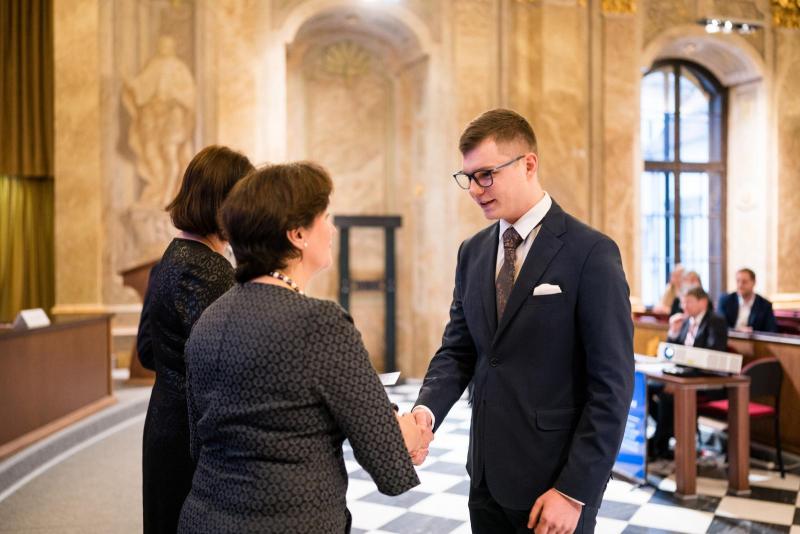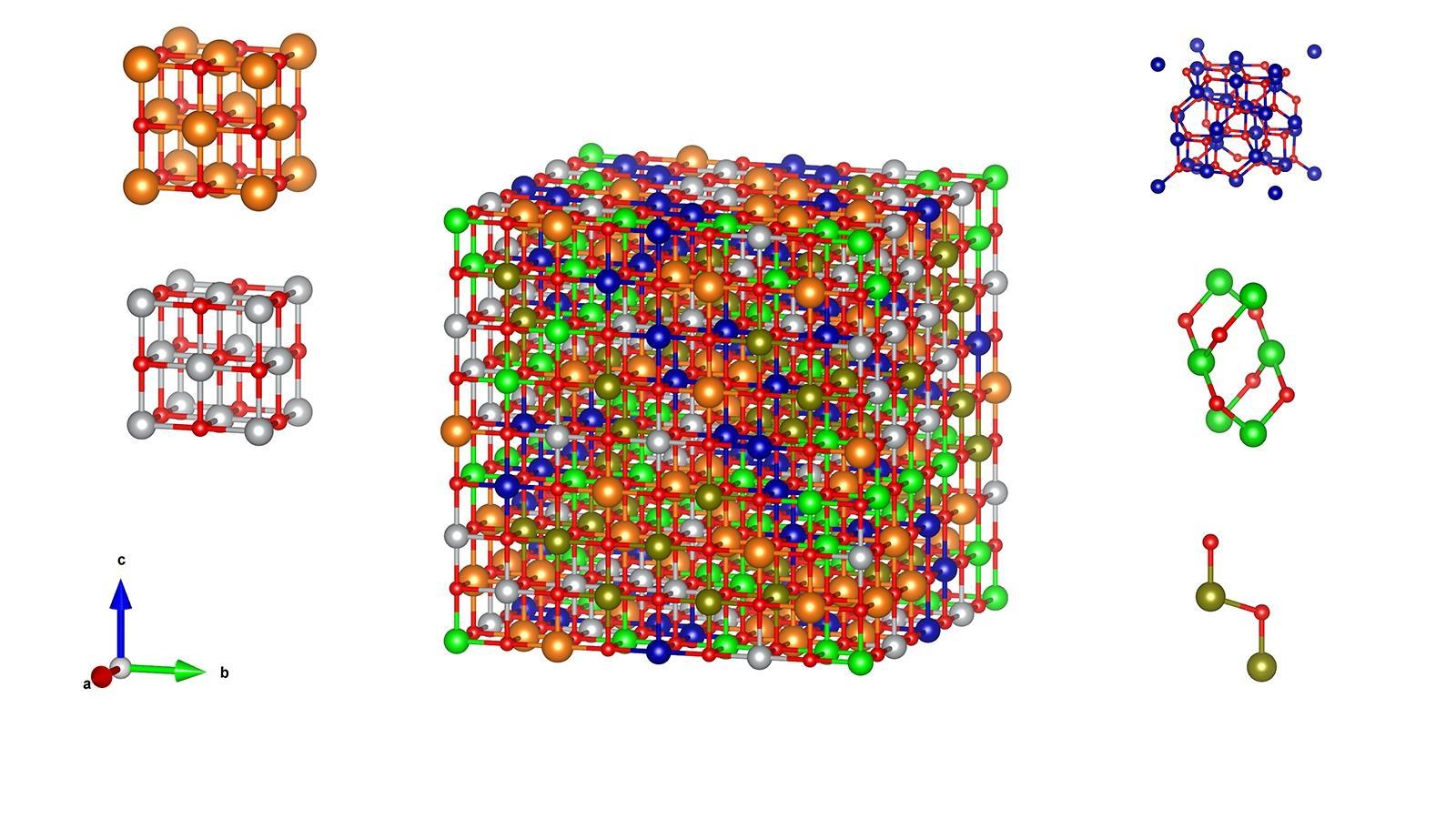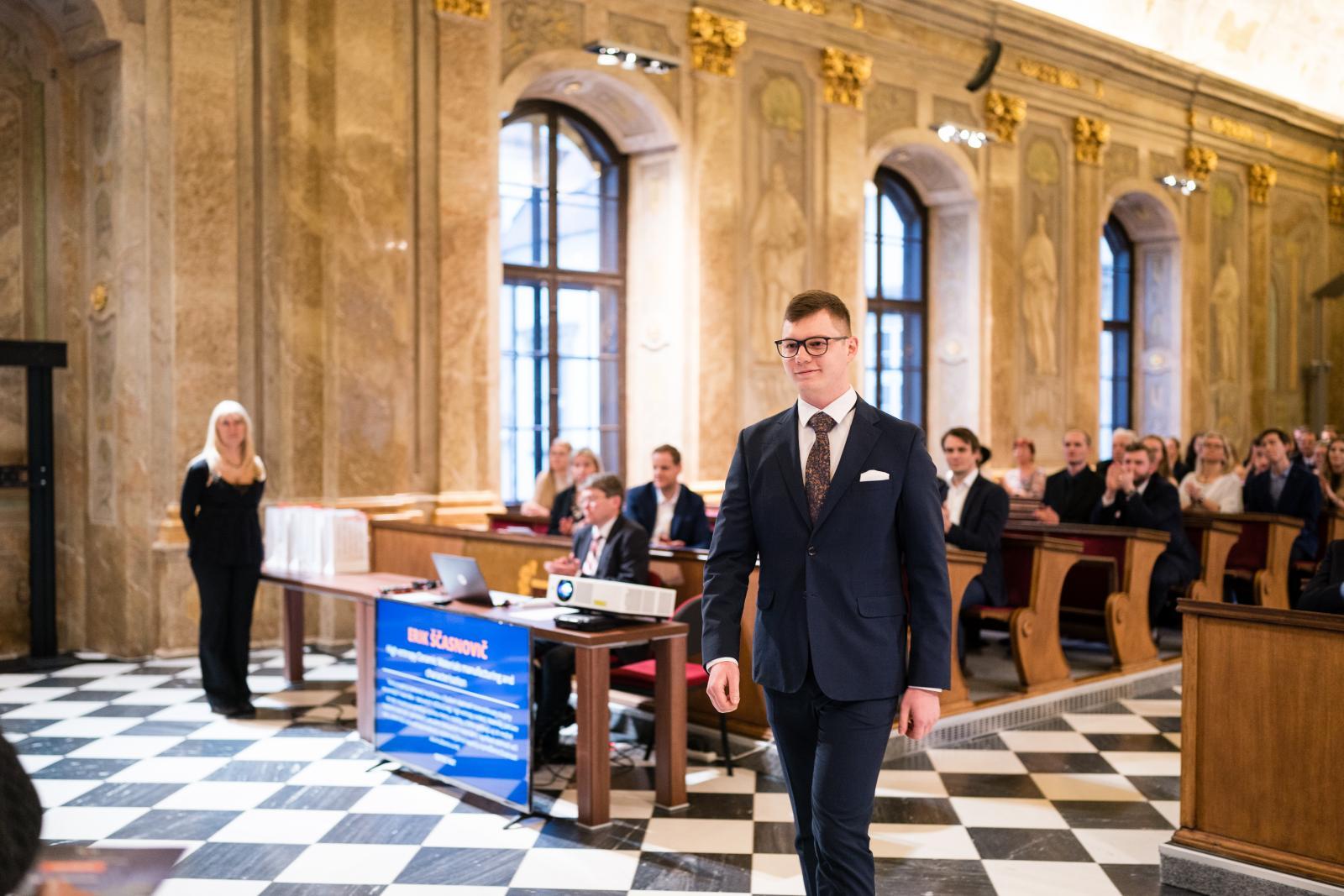People
High Entropy Oxides: Awarded PhD student Erik Ščasnovič works on research and development of new ceramic materials

For him, every day is an opportunity to learn something new. The desire to learn is stronger than traveling and visiting historical sites. He says it is enough to see them in a picture. What interests him about them are the scientific and technical possibilities that are hidden in these works. A CEITEC BUT PhD student from Prof. Maci's Advanced Multifunctional Ceramics group won the Brno PhD Talent. In his award-winning project, he focuses on the preparation and characterisation of new ceramic materials – the so-called HEOs. These could find applications in batteries, for example.
What does the award Brno PhD Talent mean for the Slovak student?
I thought it was a local, small competition that only the current class of competitors was interested in. But then my older colleagues from CEITEC congratulated me. And it was only thanks to these reactions that I found out that this is a prestigious award for PhD students, which is followed by the wider professional community.
What kind of structure does a competition project have to have?
It is a presentation of the project plan – about 12 pages of text. The first two pages contain a CV and a motivational letter, and the remaining ten pages are about the project – aim, theory, working background, collaborating colleagues, research schedule etc.
What is your winning project about?
My project deals with the study of a newly emerging group of ceramic materials called HEOs – high-entropy oxides. The materials belonging to this group are characterized by a high degree of stability and a single-phase structure, which allows achievement of better properties compared to currently available materials, e.g. better abrasion resistance, electrical conductivity/superconductivity, possible increase in battery capacity and lifetime, etc. An American professor came up with these materials in 2015 when she published a paper about them, and I would like to follow up on her research and contribute "with my own little bit".
Meaning?
When one comes up with something new, one always investigates what application it might have. We are focusing primarily on one type of the new materials mentioned, which we tentatively know could have applications in electrical engineering.
Can you describe the work you do?
I primarily work in the laboratory. I order and purchase basic powders – mainly oxides, which are ground into precise proportions in a planetary ball mill to achieve homogeneous mixing and particle size reduction. The powder thus mixed is then sintered (heat treatment of ceramic powders, where it turns into a solid mass with a specific shape). For this we primarily use electric spark plasma sintering (SPS), which not everyone has. There are only two machines in the Czech Republic – in Brno and Prague. Simply put, it consists of compressing the powder in a graphite mould and letting an electric current into it, which generates heat as it passes through the mould with the powder.

Even though I know you've been working on the project for a short time, I'll ask anyway. Have you come up with anything new?
We are still in the process of refining the preparation and processing of the material. It's very challenging to get the five elements into a single-phase structure. That means that each of the 5 materials used has a different structure of arrangement and we are trying to make them all the same. Sometimes it happens that two materials only react with each other and not with the others. So that's what we're trying to figure out now. And in the next phase we will characterize the sintered ceramics.
What do you hope to accomplish with them?
We hope to develop materials for electrical applications, for example as part of batteries. In this context, we are developing cooperation with the Faculty of Electrical Engineering, to whom we are sending samples. We should have the results within a few weeks. Specifically, these materials should serve as a battery anode or solid electrolyte. It turns out that they should have a longer lifetime and/or higher performance than the ones used so far.
Also, are there any sceptical opinions about HEOs materials not being so "awesome"?
Yes, recently such approaches have started to emerge. Our primary goal is to create a single-phase stable structure. And the sceptics think it's not stable in terms of time. That it will simply break down over time and no longer be single-phase. So now there's a debate about whether that's true. I'm a "fact-based" person – if I read some research, and preferably if I can verify it myself, then I accept it as true. But currently I can't come down on either side.
One would think that today everything has been discovered. And now you're studying new materials. How did they emerge?
(Laughs) That's what I thought before I went to college – that everything has been discovered and tested. But then I found out that in just 1 gram of zirconium dioxide there are about 5*10^21 atoms (which is a trillion particles, which is a trillion times more than people on Earth...). Each particle could be a little bit different, there could be a defect or an extra atom, an admixture of something unwanted, because the pure element is not easily extracted... So, there are a lot of variables. These new materials are the result of years of research. From the Stone Age to the Bronze Age to the Iron Age, mankind has been trying to create better and better materials in terms of properties and uses. There have been improvements in microstructure – different manufacturing and processing techniques, chemical composition – additive/alloy elements, etc. From 2004 onwards, metal alloys of 5 or more materials, the so-called high-entropy alloy, have been produced. This approach was then "picked up" by ceramists who thought: what if it is not a pure element but an oxide, it might have better properties again. And that's the evolution of new materials.
Did you always want to be a researcher with a focus on ceramics?
I wanted to be a dentist. I found out what organic chemistry was in high school. That and the fact that I enjoyed physics made me consider engineering. When my classmates and I were choosing colleges, about half of us agreed to go to Brno. It was also around that time that the Ironman movies, which I had loved since I was a kid, started coming out. These movies made me think about equipment/machines a little more comprehensively. I began to realize that it was not very effective to increase the performance of a piece of equipment by "just" increasing its power... What if you optimized the shape, working conditions or materials? That would give us a performance increase for practically "free". I chose materials engineering almost entirely by accident. I was browsing the undergraduate offerings and it caught my eye. I didn't know anything about it or research it at all. I just knew that in my mind it sounded perfect.

What's the public's view of the ceramics field, perhaps your friends?
Everybody's idea of it is that I make mugs (laughs). My father was asked by colleagues why I was going to college if I was going to make mugs and plates (laughs). Of course, he explained it to them, as I taught him at the time with about a 40-hour lecture (laughs). But I must admit that even I used to associate ceramics only with kitchen dishes. At least now people know that you can also make ceramic dental implants or dentures.
So how do you explain what you do?
I thought about it and came up with a universal explanation – ceramics is what you're left with when you exclude metals and plastics. Everything else is mostly ceramic. And that's what people around me have begun to understand. The downside is that people often confuse it with, for example, glass, whereas on watches it's often transparent ceramic. Furthermore, ceramics are used in electrical engineering in the form of oxides, for example silicon and others, which are used as components in devices such as phones and computers. Ceramics is the kind of secret hero that few people see.
Would you like to return to Slovakia?
I don't think so. I lived near one of the bigger cities in Slovakia and then I moved to Brno. And I found out what it had to offer. For example, after 10pm you can order any food you want, there's CEITEC, there's a million options, about five swimming pools, different sports facilities. There are no such facilities in Slovakia except in Bratislava. But I don't find the capital city suitable for living, it's about the same as you have with Prague. Brno is so rural, but with the advantage of the capital.
Are you going on an internship?
It wouldn't make sense yet because we're really at the beginning of this project. But my supervisor and I are talking about the possibility of going to the UK or China. I'll then choose based on whether the country has something to offer me in terms of research. I don't need or have any desire to do any sightseeing – for example, the Eiffel Tower or Notre-Dame and basically almost any historical building doesn't attract me at all. If I want to, I look at Google maps, and that's enough for me.
Is there really nothing you want to see? Where are you going on vacation, for example?
Jordan, but that's more for my partner who has friends there from her internship. So, we're primarily going there for the people, not so much for the sights. But what I dream about is Japan. What I like about the Japanese is that they are very honest and hardworking. They're reliable. That's very likeable and close to my heart because that's the kind of values I've always been led to. Go everywhere on time, always behave, always greet elders - these are just basic things that my parents put on my heart and that I still follow.
So, you are attracted to nature and the desire for knowledge. You always need to learn something new, don't you?
That's pretty accurate. I always need to absorb new information. I've even thought about my hobbies, and I haven't really stuck with anything for long. Because I don't like not moving, not seeing results. I need to see them and ideally now. At CEITEC I often stay up late into the night, twelve hours a day, to get new information. When something doesn't work or doesn't work in our project, I usually dig into the books, ask professors, and associate professors for help. Fortunately, they are always very helpful and supportive.
Source: CEITEC BUT
Motor failures in electric vehicles can be detected by mathematical algorithms from the BUT
Awarded student Hana Kopřivová aims to come up with a new system for diagnosing tumors
Innovative composite from TRICERA ensures lower weight of safes or higher resistance of police shields
A thin surface on the phone instead of four lenses. Metasurface will help us analyse our lunches one day
Two awards for young scientist Markéta Tesařová